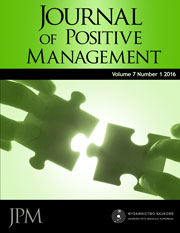SOCIAL IMPACT BONDS: AN INNOVATIVE WAY TO COMBAT YOUTH UNEMPLOYMENT
DOI:
https://doi.org/10.12775/JPM.2016.003Keywords
social impact bonds, employment measures, youth unemployment, corporate social responsibility, positive managementAbstract
Purpose: To explore whether the so-called social impact bonds (innovative fi nancing of social interventions) are a desirable and feasible alternative in combatting youth unemployment. Approach: Literature study and semi-structured interviews.
Findings: Social impact bonds are an important addition to the existing employment measures.
Limitations: Sole focus on the situation in the Netherlands; limited expertise.
Value of the paper: The paper off ers an understanding of a new instrument that leads to fundamental changes in the way social issues are tackled. In relation to positive management, social impact bonds call upon the corporate social responsibility of private parties to invest in social interventions.
References
Andriessen, S., Brouwer, P, (2014), Social return en verdringing: Strategieën ter preventie, een verkenning, TNO, Hoofddorp.
Bartley, M. (1994), “Unemployment and ill health: understanding the relationship”, Journal of Epidemiology and Community Health, Vol. 48, pp. 333–337.
Bouma, S., Witkamp, A., Engelen, M. (2015), Monitor Regionale Aanpak Jeugdwerkloosheid: Meting 3, Panteia, Zoetermeer.
Callanan, L., Law, J., Mendonca, L. (2012), From potential to action: Bringing social impact bonds to the US, McKinsey & Company, New York.
Costa, K., Shah, S., Ungar, S. (2012), Frequently Asked Questions: Social Impact Bonds, Center for American Progress, Washington.
Deloitte (2014), Werkplaats Rotterdam-Zuid opent deuren, available at: http://www2. deloitte.com/nl/nl/pages/about-deloitte/articles/werkplaats-rotterdam-zuid-opentdeuren.html (accessed 11 November 2015).
Es, B. van, 2015, Social Impact Bonds: Een Nieuw Instrument om Jeugdwerkloosheid te Bestrijden, Kenniscentrum Innovatief Ondernemerschap, Rotterdam.
Finance for Good (2015), Finance for Good Social Impact Bond Tracker, available at: http:// financeforgood.ca/social-impact-bond-resources/sib-tracker/ (accessed 20 February 2015).
Gemeente Rotterdam (n.d.), social impact bonds rotterdam, available at: http://www. rotterdam.nl/socialimpactbondsrotterdam (accessed 11 November 2015).
Gemeente Utrecht (2015), Financiële impuls biedt extra werk voor 540 jongeren in Utrecht, available at: http://www.utrecht.nl/nieuws/artikel/financiele-impuls-biedt-extra-werk -voor-540-jongeren-in-utrecht/ (accessed 30 November 2015).
Goodall, E. (2014), Choosing Social Impact Bonds: A Practitioner’s Guide, Bridges Ventures, London.
Hoedt, M. den, Schofaerts, K., Turmel, D. (2014), Evaluatie implementatie social return rijksoverheid, Ipso Facto Beleidsonderzoek, Den Haag.
Inspectie Werk en Inkomen (2010), Participatie in crisistijd, Sociale Zaken en Werkgelegenheid, Den Haag.
Kok, L., Houkes, A. (2011), Gemeentelijk re-integratiebeleid vergeleken: een literatuurstudie, Raad voor Werk en Inkomen, Den Haag.
Koning, J. de, Gelderblom, A., Zandvliet, K., Boom, L. van den (2005), Effectiviteit van reintegratie: De stand van zaken, Sociaal-Economisch Onderzoek Rotterdam, Rotterdam.
Lakey, J., Mukherjee, A., White, M. (2001), Youth Unemployment, Labour Market Programmes and Health: A Review of the Literature, Policy Studies Institute, London.
Lunes, R., Frissen, R., Vermeer, F., Revenboer, A. (2013), Social Impact Bonds: Een verkenning naar de kansen van een innovatief financieringsarrangement, Society Impact Platform, Den Haag.
Murphy, G., Athanasou, J. (1999), “The effect of unemployment on mental health”, Journal of Occupational and Organizational Psychology, Vol. 72, pp. 83–99.
Nazar, A. (2010), Wat werkt? Wat weten we over effectiviteit, Dienst Werk en Inkomen, Amsterdam.
OECD (2008), “Off to a good start? OECD Youth labour market transitions in OECD countries”, in: OECD Employment Outlook, Organisation for Economic Co-operation and Development, Paris, pp. 25–77.
Ruth, A. Van, Smink, J. (2013), Onderzoek ontsloten: Effectiviteit subsidies, Gemeentelijke Rekenkamer Nijmegen, Nijmegen.
Social Finance (2009), Social Impact Bonds: Rethinking finance for social outcomes, Social Finance, London.
Traag, T., Marie, O. (2011), “Voortijdig schoolverlaten, werkloosheid en delinquentie: cumulatie van risicogedrag onder jongeren in Nederland”, Sociaal economische trends: 4e kwartaal 2011, CBS, pp. 15–19.
Vennema, B., Koekoek, R. (2013), Social Impact Bonds: Introductie van een nieuw financieringsmodel in Nederland, ABN AMRO, Amsterdam.
Visser, S. de, Witkamp, A., Engelen, M. (2014), Monitor Regionale Aanpak jeugdwerkloosheid: Eindrapport Meting 1, Zoetermeer, Panteia.
Downloads
Published
How to Cite
Issue
Section
License
Copyright
Articles submitted to the journal should not have been published before in their current or substantially similar form, or be under consideration for publication with another journal. Authors submitting articles for publication warrant that the work is not an infringement of any existing copyright and will indemnify the publisher against any breach of such warranty. For ease of dissemination and to ensure proper policing of use, papers and contributions become the legal copyright of the publisher unless otherwise agreed.
Plagiarism and ghostwriting
In response to the issue of plagiarism and ghostwriting the editors of the Journal of Positive Management has introduced the following rules to counteract these phenomena:
1. Contributors should be aware of their responsibility for a content of manuscripts.
2. Collective authors are obliged to reveal the contribution and an affiliation of each author (i.e. who is an author of specified part of a paper).
3. Any act of dishonesty will be denounced, the editors will inform appropriate institutions about the situation and give evidence of all cases of misconduct and unethical behaviour.
4. The editors may ask contributors for financial disclosure (i.e. contribution of specified institutions).
Stats
Number of views and downloads: 1087
Number of citations: 0



